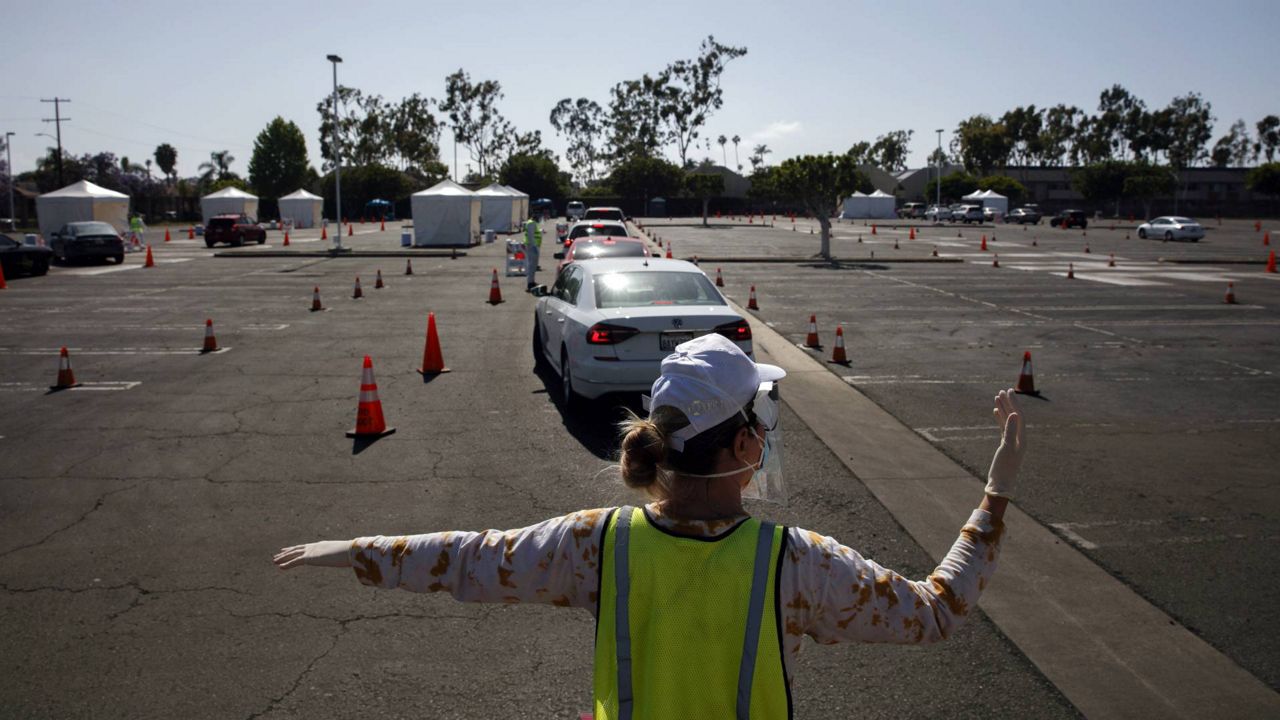WESTMINSTER, Calif. — The COVID-19 Clinic at the Westminster Mall started as a one-site operation.
The drive-thru testing site at an unused parking area opened a couple of weeks after the pandemic began and immediately drew hundreds of clients.
As the pandemic wore on, from that one operation, the COVID Clinic has grown to more than 20 sites in Southern California and more in Arizona, Nevada, Oregon, and Washington. They currently have more than 60 locations nationwide, and more are coming.
Even as states are rushing to vaccinate people, the slow rollout is still creating a demand for more testing sites. The COVID Clinic is still getting calls from other states to set up sites in Texas, Georgia, and most recently in Virginia, explained Wendy Dahl, chief growth officer at the COVID Clinic in Huntington Beach.
"We have state health departments calling us up, asking for help," she said.
COVID Clinic's growth highlights the boom in the number of coronavirus-related businesses that began popping up across Southern California during the pandemic.
Testing sites became a niche business enterprise, taking up small retail storefronts and empty parking lots. Companies specializing in making and distributing personal protective equipment, face shields, and hand sanitizers were scooping up warehouses and other industrial buildings. And many biotech firms working to develop a COVID-19 vaccine or effective treatment expanded and gobbled up office space.
"It was crickets in March [when the pandemic began], and we were all extremely concerned for our clients," said Chase MacLeod, managing director of industrial services for Greater Los Angeles at Stream Realty Partners. "We went through a lot of panic in March and April, and then we saw this shift. We started to see a lot of [leasing] activity."
In July, MaxCare Products, a manufacturer and distributor of medical supplies, including face masks and personal protective equipment, signed a lease for 60,000 square feet of space in Santa Ana.
"The unfortunate COVID crisis has created significant demand from medical supply companies looking to be closer to their customers," said Steve Wagner, managing director at JLL, in a news release.
MacLeod added that other companies that manufacture plastic face shields signed leases as production sites. Personal protective equipment distributors were taking warehouses in the 50,000 to 150,000 square foot range. Several companies shifted their business model to start manufacturing hand sanitizers and make personal protective equipment garments.
"These were opportunities that presented themselves," said MacLeod.
On the office side, biotech companies received a record $17.8 billion in venture capital funding at the end of the second quarter of last year, according to a CBRE report. Half of those investments went to biotech firms in the San Francisco Bay Area and Boston-Cambridge area and trickled down to companies in Orange and L.A. counties.
According to CBRE, Orange and L.A. county companies recorded $379 million in venture capital funding. The report reads:
"The life sciences industry has been thrust into the spotlight as the United States faces its greatest public health crisis in a century. Investors have a heightened interest in the life sciences industry as it works to develop a vaccine and effective treatments for COVID-19, along with other medical breakthroughs. This in turn is creating new opportunities for commercial real estate."
In October, Innova Medical Group, which makes and distributes COVID-19 test kits, signed a 15,000-square foot lease for an office in Pasadena. On the retail side, several niche businesses focusing on COVID-19 testing began popping up.
"There's a lot of them," said Dan Bacani, a principal and shareholder at Lee & Associates Pasadena, who added that he'd received calls from companies wanting to set up a COVID-19 testing site at some of his listings, but none came to fruition.
"Landlords are wary of signing a long-term lease with these testing facilities because they don't see them lasting for more than a year," Bacani said. "It's a temporary thing. Once folks get inoculated, hopefully, within the next six months, these mass testing sites are going to go away."
For Wendy Dahl, chief growth officer at COVID Clinic, they've done well so far and continue to expand their drive-thru and walk-up COVID-19 testing. She explained that when the company begins scouting an area to set up a site, it looks at population density and then the ability to test at a certain retail site. They then get the city's necessary approvals, the city's health department, and lab licensing permit.
They prefer empty parking lots, she added.
"Our smallest footprint is 20 parking spaces, and our largest is 120 spaces," said Dahl. "Everything is based on the square footage of an [parking] area and the driving lanes in between them."
She did not disclose the terms of the agreements her company has with the landlords. Sometimes it's month-to-month, others are 6-month leases.
"It varies market by market and mall owner or commercial property owner," Dahl said.
With the vaccine coming out, COVID-19 testing sites may no longer be needed. But Dahl noted that she's hoping that they can partner with the state or local city or county health agencies and use these drive-thru testing sites to begin inoculating residents. She knows that the state and local officials have been slow in rolling out the vaccine to the community. COVID Clinic can assist them, she said.
"We would love to have the opportunity to join in and serve our community. We can roll that out very quickly, safely and efficiently. Just give us the opportunity."



